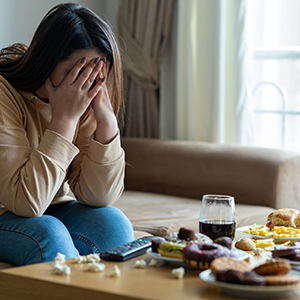Emotional Eating: How to Cope

If you raid the fridge when you’re stressed or upset, that’s called emotional eating. Emotional eating affects most people from time to time. But regularly letting your feelings guide your food intake can affect your health.
Sadness, boredom, and other negative feelings can drive emotional eating. Emotional eating includes eating a whole container of ice cream when you’re sad. Or devouring a bag of potato chips when you’re anxious or distracted. But happy events can lead to it, too. Many people overeat at joyous events such as parties and weddings.
More serious conditions can be linked to emotional eating. One is binge-eating disorder. This is marked by eating very large amounts of food well after you already feel full.
Eating more food than your body needs can have dangerous results. People who eat for emotional reasons often gain too much weight. This puts them at greater risk for type 2 diabetes, high blood pressure, obesity, and cancer. Excessive eating has emotional consequences as well. These include feeling guilty or embarrassed afterward.
Strategies to deal with emotional eating
Here are steps you can take to stop emotional eating episodes and break the cycle:
Learn to recognize hunger

Next time you reach for a snack, ask yourself what’s driving it. If you are truly hungry, you’ll notice physical symptoms such as a growling stomach. Other less obvious hunger cues include grouchiness and trouble focusing. If you don't have those signs, you likely don’t need to eat right then.
Keep a journal
Take the time to create a mood and food journal. Write down what and when you eat each day. Be sure to include the feelings you were having at the time and if you were truly hungry. Once you begin to assess your real eating habits and what’s behind them, you may find that certain feelings, like anger or sadness, lead to your overeating.
Once you recognize these triggers, you can learn healthier ways to deal with them, such as taking a walk around the block.
“If you find that you are using food to avoid emotions, ask yourself what can help you cope with that emotion, explains registered dietitian Tara Rybicki, Munson Medical Center’s Community Health Coordinator. ”The problem with avoiding emotions rather than doing the work to care for them is when you run from an emotion, the faster it will follow the and stronger it becomes.”
Build a support network

Having loved ones around you who support your efforts to change your eating habits can improve your chances of success. It may also be helpful to join a support group, such as Overeaters Anonymous, to meet other people with similar struggles and learn better ways of coping.
Find other interests
Finding an activity that you enjoy can increase self-confidence, which emotional eaters often battle.
Yoga, mastering a musical instrument, volunteering, or painting are all examples of fun ways to boost the way you feel about yourself, while also filling your hours, making you less likely to look to food for emotional satisfaction.
Get help if needed
If you can’t control emotional eating on your own, think about getting professional help to change your behavior. A form of psychotherapy called cognitive behavioral therapy can help.
It can teach you to change your eating habits and deal with unpleasant emotions in a better way. Medicines, including antidepressants and appetite suppressants, may also help. Talk with your healthcare provider to learn about more treatment choice
Related Blogs:
- 5 Expert Tips for Getting Your Diet Back on Track
- The Key to Managing Stress
- 12 Foods with the Healthiest Bang for Your Buck
- Nutrition Tips and the Practice of Mindful Eating
- Fresh, Canned, or Frozen Produce